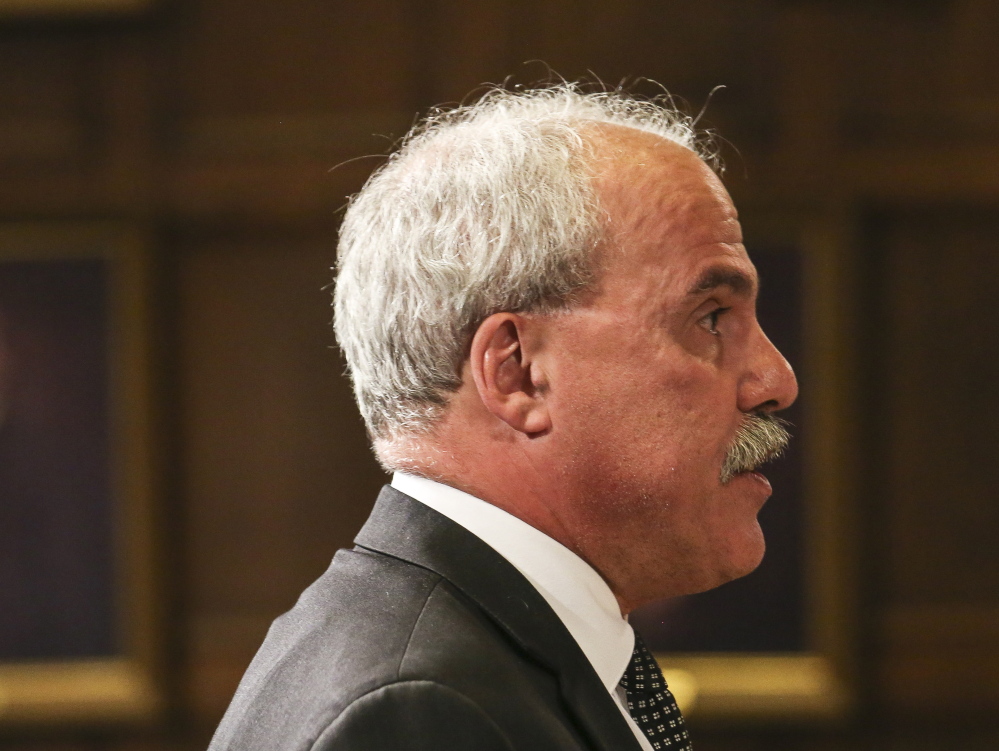The Portland City Council considered two minimum wage initiatives Monday night, voting to place a citizens referendum to establish a $15-an-hour rate on the November ballot, while delaying a move to revise its own troubled ordinance to raise the minimum to $10.10 an hour.
The council voted to delay until Sept. 9 reconsidering the ordinance it passed to adopt a citywide minimum wage higher than the state’s because it wanted to give staff more time to develop proposals for how to handle tipped workers.
Monday’s unanimous vote came after councilors realized the ordinance they passed on July 6 effectively doubled the base wage for tipped workers – primarily waiters and waitresses – when that was not the intent. Such an increase faced stiff opposition from the restaurant industry. Portland Mayor Michael Brennan had intended to exclude tipped workers to ease those concerns.
Councilors voted, also unanimously, to send the citizens initiative to create a $15 an hour minimum wage to voters in November, but declined to place a competing measure on the ballot – a move some councilors and members of the public saw as an effort to undermine the proposal.
Portlanders for a Living Wage, a ballot action committee, are advocating for a $15 an hour minimum wage for all employees except tipped workers by 2019. Employers having 500 employees or fewer would have four years to transition, while those with more than 500 employees would have to comply by 2017. Future increases would be tied to inflation.
Their proposal would also include a significant increase in the base wage for tipped workers, who would earn $11.25 an hour once the phase-in period ends.
The group, composed largely of Portland Green Independent Committee members, collected well over 1,500 signatures from registered voters.
If the measure passes in November, the council wouldn’t be able to modify it for five years.
Mako Bates, who authored the livable wage ordinance for the Portland Green Independent Committee, said a livable wage is what one has to earn to live and participate in their community working a full time job.
Many people making minimum wage are single parents and those who are underemployed, Bates said. The group chose $15 an hour because there is a national movement for that figure, he said.
“We think it’s a reasonable number. We think it’s the right number for Portland.”
Representatives of the hospitality industry opposed the proposal.
Greg Dugal, executive director of the Maine Restaurant and Innkeepers Association, said the livable wage would cause “serious issues” for city businesses, which would have the highest minimum wage east of the Mississippi River.
Dugal also said average profit margins for restaurants are about 4 percent – not enough to absorb such a large increase. The increase would force some restaurants to leave the city, he said.
“Our hope is that the citizens of Portland see this as an unreasonable and irresponsible burden on Portland businesses resulting in the opposite effect for hospitality and other workers with severely reduced employment levels.”
Councilors considered offering a competing measure to go alongside the $15 an hour proposal.
Councilor Edward Suslovic proposed including a modified version of the minimum wage proposal being considered by the council, but it failed to generate support.
The competing measure would have allowed the council to amend the ordinance soon after it passed and remove future increases tied to inflation. It would also keep the base wage for tipped workers at $3.75 an hour.
The council, meanwhile, will reconsider its ordinance in September to allow staff time to draft a menu of options for councilors to consider.
“This item gives us the opportunity to clarify exactly what we intended to do,” said Councilor Jill Duson, who voted in support of the ordinance, but moved to reconsider.
Councilors voted July 6 to establish a $10.10 an hour minimum wage as of Jan. 1. The following year, that wage would increase to $10.68 an hour and future increases would be tied to inflation.
The council thought it was keeping the base pay for tipped workers at one half of the state minimum wage of $7.50, but instead the ordinance would increase it from $3.75 to $6.35.
The confusion surrounding the minimum wage ordinance centers around the tip credit, which is the amount an employer doesn’t have to pay a tipped employee, versus base pay, which is what the employer is required to pay.
During a workshop before the meeting, councilors were presented with an option to keep the base wages of tipped workers – anyone who earns $30 or more a month in tips – the same, while also ensuring they earn at least $10.10 an hour.
Glenn Israel, an attorney contracted to assist the council on the wage issue, said that tip credits are simply a way to establish a base wage for a tipped worker.
Israel said the council could simply keep the base pay at 50 percent of the state minimum wage of $7.50, or $3.75 an hour. If a tipped worker failed to make at least $10.10 an hour after tips, their employer would be required to pay the difference.
Some councilors, however, expressed an interest in paying tipped workers half of the city’s new minimum wage proposal.
Send questions/comments to the editors.






Success. Please wait for the page to reload. If the page does not reload within 5 seconds, please refresh the page.
Enter your email and password to access comments.
Hi, to comment on stories you must . This profile is in addition to your subscription and website login.
Already have a commenting profile? .
Invalid username/password.
Please check your email to confirm and complete your registration.
Only subscribers are eligible to post comments. Please subscribe or login first for digital access. Here’s why.
Use the form below to reset your password. When you've submitted your account email, we will send an email with a reset code.